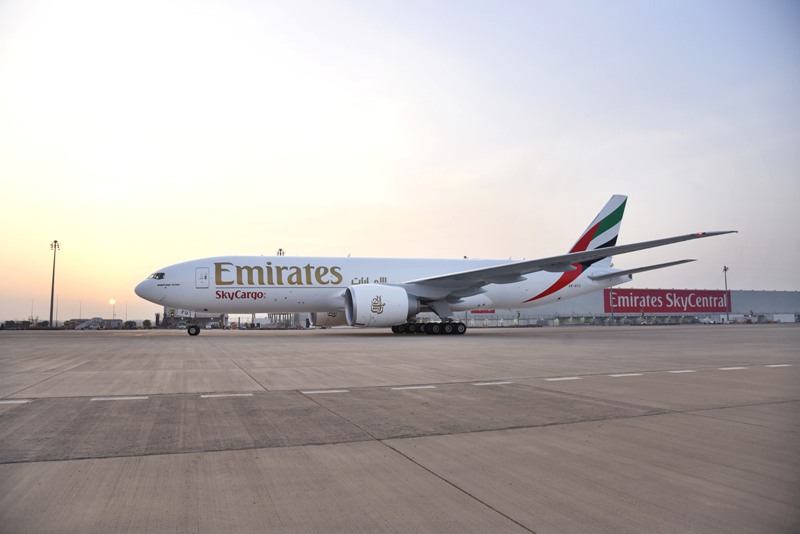Sea-air and product demand on the up at Emirates SkyCargo
15 / 08 / 2022

Dennis Lister, Emirates vice president, cargo commercial development
Emirates SkyCargo is expecting recent strong demand for sea-air services to continue, whilst volumes transported through its various product lines have also soared over the past could of years.
Speaking to Air Cargo News, Emirates SkyCargo vice president cargo commercial development Dennis Lister says the pandemic had helped accelerate the use of sea-air services that ship goods to a hub and then fly them to their destination.
He explains that the supply chain disruption experienced in container shipping during the last couple of years resulted in companies switching to alternative transport solutions that offered more security without costing as much as a point-to-point airfreight operation.
In Emirates SkyCargo’s case, this involved goods transported by ocean from Asia to Jebel Ali and then flown out of Dubai to Europe or the Americas.
“We have seen sea-air become quite a big trend – as it has done throughout Covid – and we see it continuing,” says Lister.
He says that part of the reason for the continued use of sea-air, even though supply chain issues have eased, is that companies that utilised the multimodal solution during Covid were able to see the benefits it can offer.
“I think there is confidence now in the solution, that it works,” says Lister. “Coming out of the back end of Covid there were massive constraints in ocean and airfreight and therefore to try and get a solution from China or Chittagong, for example, feeding all the way into Europe or the US was very difficult.”
He adds: “Customers have been testing that throughout Covid and we see that even the high-value products are now moving on these intermodal solitons and that continues.”
Lister says that over the past couple of years, the airline’s sea-air volumes have grown by 66% and during the last two years, 24,000 tonnes of sea-air was moved through the carrier’s Dubai hub.
Product prominence
Elsewhere, Lister says that Emirates has also noticed an increase in the use of its products, such as Pharma, Fresh and Live.
Lister says that some of the growth in the use of its products was in line with air cargo market growth as volumes switched to air and there was an increase in e-commerce volumes.
Those airlines that were able to continue and expand cargo flying with freighters and mini-freighters, such as Emirates, were able to pick up extra demand.
Meanwhile, the Pharma product saw traffic improve because of the demand to move Covid vaccine shipments.
“We moved 1bn vaccines, as we stand today, for Covid specifically,” says Lister. “We have always been moving vaccines as an airline so that is not new to us.
“If you look at the total pharma basket, roughly 10-15% overall is usually vaccines and then on top of that we had to move an additional billion doses needed through that period.”
Lister says that during the 2021/2022 financial year, Emirates moved around 84,000 tonnes of pharma, an increase of 20%, while its fresh volumes improved by around 10% to 260,000 tonnes.
“The final point is, we have invested in infrastructure for those products over the last five years,” lister says.
“We built cool facilities and we were the first airline to bring in cool dollies to cater for temperature control on-ramp.
“We have also brought specialists in to manage those products, people that have that expertise and give the reassurance that when you bring a vaccine through, it will maintain that integrity door to door.”
Freighter investment
As well as investing in facilities, Emirates SkyCargo is also investing in aircraft.
At the tail end of last year, the airline announced a $1bn spend on two new B777Fs – both of which have been delivered – and the conversion of four passenger B777s into cargo aircraft.
The carrier has since lined up another six B777 aircraft for conversion, with deliveries due to start towards the end of 2023.

Source: Emirates SkyCargo
However, the freighter demand boom caused by the Covid pandemic looks to be coming to an end due to the rising cost of living, the Ukraine-Russia war and modal shift back to ocean.
With this in mind, is Lister concerned about weakening freighter demand given its plans to expand in all-cargo?
“The need for freighters will continue to grow,” he says. “If you look at the old B747Fs, it is an aging fleet.
“Getting access to spare parts for these aircraft is becoming more and more difficult.
“And if you look at some of the sectors that are growing, e-commerce for example, the drive for cross-border activity and international selling will continue to grow.
“Also, the fact that supply chains are shifting and there are more manufacturing markets, such as Vietnam, Cambodia and South Korea.
“We see more manufacturing going into these markets and therefore the demand for freighters will continue.”
On the converted aircraft, Lister explains that carrying out the procedure extends the life of its existing fleet for another 10 years, which is good from a sustainability angle and means Emirates does not need to invest in new aircraft.
Meanwhile, the converted aircraft have space for an extra 10 pallet positions and are more fuel efficient than B747Fs, making them ideal for e-commerce.
Elsewhere, the company continues to invest in digitalisation as it seeks to become “better connected with the customer”.
“We want ease of use with Emirates,” he says. “We want people to dynamically price with us, having the ability to use the distressed inventory on the aircraft. I think those are the sort of things we are pushing hard on.
“The industry is still lagging behind overall as we are still very much a paper-based sector and we need to move away from that.
“I think that now we have got Covid behind us we can put all our attention and focus on some of these key projects.”
Lister finishes the interview by highlighting five key trends he expects to affect the airfreight market in the coming years: e-commerce, shifting supply chains, big corporate mergers and acquisitions in logistics, digitalisation and sustainability.
“We will continue to focus on those trends and continue to make the right decisions and really be part of that value chain; whether it is airport to airport or supporting the BCOs and 3PLs with end-to-end logistics,” he concludes.
Emirates SkyCargo to expand freighter capacity and launch new China services














